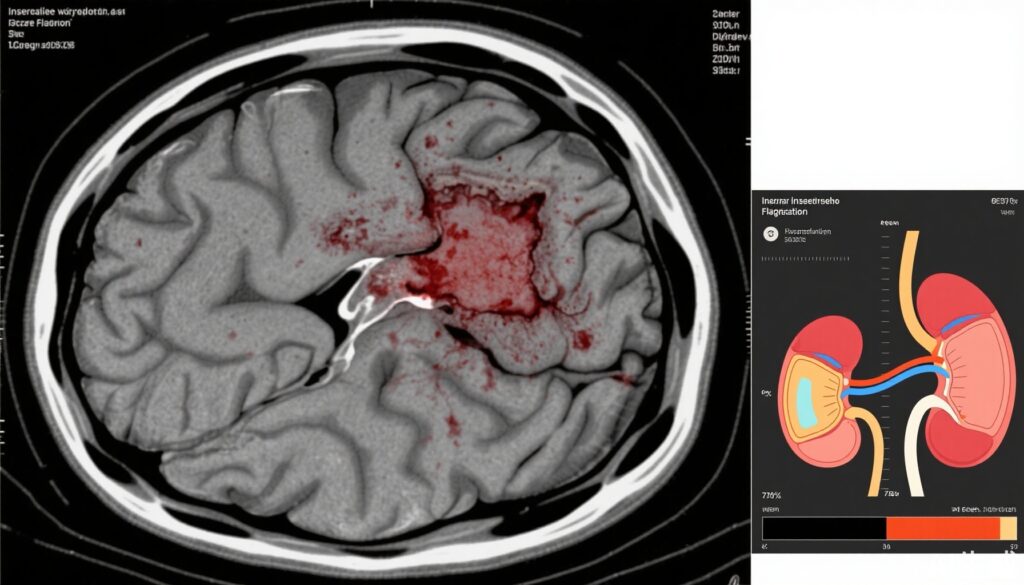Highlight
1. The OPTIMAS trial evaluated the timing of direct oral anticoagulant (DOAC) initiation after acute ischemic stroke (IS) in patients with atrial fibrillation (AF), stratified by chronic kidney disease (CKD) status.
2. Early DOAC initiation (within 4 days) compared to delayed initiation (days 7-14) showed no difference in recurrent ischemic stroke, intracranial hemorrhage, systemic embolism, or mortality in both CKD and non-CKD groups.
3. CKD does not modify the effect of early versus delayed anticoagulation initiation, supporting early treatment for stroke prevention in patients with AF regardless of kidney function.
4. These findings address safety concerns and may inform clinical guidelines to optimize anticoagulation timing in this high-risk population.
Study Background and Disease Burden
Atrial fibrillation (AF) is a well-established risk factor for ischemic stroke (IS), necessitating anticoagulation to reduce thromboembolic complications. Direct oral anticoagulants (DOACs) have become first-line agents for stroke prevention in AF due to their favorable safety and efficacy profiles. However, patients with chronic kidney disease (CKD) represent a complex subset because CKD independently increases risks of both ischemic stroke and intracranial hemorrhage. This dual risk complicates anticoagulation decisions, particularly timing of initiation after acute IS. Early anticoagulation may prevent recurrent embolic events but raises concerns of hemorrhagic transformation in damaged brain tissue, especially in CKD patients with altered drug clearance and vascular fragility.
Given the global burden of AF-related stroke and increasing prevalence of CKD, evidence guiding anticoagulant timing in this vulnerable population has been limited and inconsistent, constituting an unmet clinical need.
Study Design
The OPTIMAS trial was a large, multicenter, randomized, parallel-group, open-label trial with blinded outcome assessment, conducted across 100 UK hospitals from 2019 to 2024. It enrolled 3601 patients with acute ischemic stroke and atrial fibrillation. Participants were randomized 1:1, with stratification by stroke severity, to receive early DOAC initiation (within 4 days of stroke onset) or delayed DOAC initiation (days 7-14 post-onset).
CKD status was documented as part of baseline medical history per trial protocol. This subgroup analysis compared outcomes between patients with known CKD (n=543) and those without CKD.
The primary composite outcome included recurrent ischemic stroke, symptomatic intracranial hemorrhage, and systemic arterial embolism. Secondary endpoints assessed each component individually, as well as all-cause mortality.
Key Findings
Among 3601 patients (mean age 78 ± 10 years; 45% female), there were 116 primary composite outcome events: 97 (3.2%) occurred in the non-CKD group and 19 (3.5%) in the CKD group.
For the primary composite endpoint, early vs. delayed DOAC initiation showed no significant difference in the non-CKD group (odds ratio [OR] 1.01; 95% confidence interval [CI], 0.67–1.51) or the CKD group (OR 0.90; 95% CI, 0.36–2.25), with no significant interaction between treatment timing and kidney status (Pinteraction=0.822).
Secondary outcomes including recurrent ischemic stroke (Pinteraction=0.637), symptomatic intracranial hemorrhage (Pinteraction=0.386), and all-cause mortality (Pinteraction=0.107) similarly showed no modification of treatment effects by CKD status.
Safety was comparable across subgroups, with no evidence of increased hemorrhagic complications among CKD patients initiating early anticoagulation.
Expert Commentary
The OPTIMAS trial robustly addresses a vital clinical question by including a large, representative cohort with a clear CKD subgroup analysis and rigorous outcome adjudication. The lack of effect modification by CKD strengthens the rationale for prompt anticoagulation after acute ischemic stroke in AF patients, attenuating previous concerns about early bleeding risk in CKD.
However, the trial’s open-label design warrants consideration of potential biases, though blinded outcome assessment mitigates this. CKD was defined by history rather than quantified glomerular filtration rate (GFR) measures, which may limit granularity in assessing renal function severity.
These findings align with emerging guidance advocating early DOAC initiation, highlighting that withholding anticoagulation in CKD patients solely based on renal impairment may be unwarranted. Future research may explore differential effects across CKD stages and DOAC dosing adjustments.
Conclusion
The OPTIMAS trial advances clinical knowledge by demonstrating that chronic kidney disease does not alter the efficacy or safety of early direct oral anticoagulant initiation following acute ischemic stroke in patients with atrial fibrillation. Early anticoagulation should not be delayed based on CKD status, which could prevent preventable thromboembolic events without increasing hemorrhagic risk.
Implementing these findings into clinical practice may improve stroke prevention strategies and patient outcomes across heterogeneous risk profiles. Ongoing efforts to individualize therapy according to renal function and stroke characteristics remain essential to optimize benefits and minimize harm.
References
Nash PS, Dehbi HM, Ahmed N, et al; OPTIMAS Investigators. Anticoagulation Timing in Acute Stroke With Atrial Fibrillation According to Chronic Kidney Disease: The OPTIMAS Trial. Stroke. 2025 Aug;56(8):1970-1979. doi:10.1161/STROKEAHA.125.051457.
Additional literature on AF, CKD, and anticoagulation from Clinical Guidelines (e.g., ESC, AHA/ASA, KDIGO) was considered to contextualize findings.



